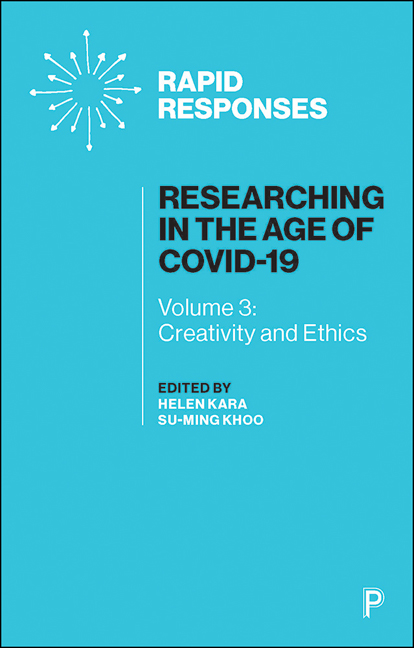Introduction
Published online by Cambridge University Press: 23 March 2021
Summary
Since the global COVID-19 pandemic began in the early months of 2020, researchers have had to respond to new limitations, reassess and rethink their ongoing and near-future research. Some research is about emergencies like the current COVID-19 health emergency, some research is not specifically about emergencies or disasters but takes place in a context already affected by emergency or disaster. Some research has nothing to do with emergencies or disasters at the outset but must deal with one (or more) that unfolds as the research proceeds. As the world continues to deal with the reality of COVID-19 in the longer term, researchers are reminded that emergency and disaster situations are ongoing in many contexts or may occur at any time. The challenges of researching in an emergency-affected context also present a crucial opportunity to critically reflect on the fundamental purposes, assumptions and issues driving that research, as well as more practical issues around the choice of methods and manner of implementation.
The eruption of a global health emergency like COVID-19 offers important opportunities to reassess the role of creativity and ethics in research. It surfaces broader and deeper ethical questions beyond adherence to the necessary but limited formal procedures of standard institutional research ethics approval. Researchers in every part of the globe have responded to the new challenges of researching amidst the COVID-19 pandemic in diverse, thoughtful and creative ways – from adapting their data collection methods to rethinking researcher–researched relationships and fostering researcher and community resilience, while accommodating different needs for care.
Creativity and ethics are linked in research. New problems stimulate creativity, because they disrupt given assumptions and present demands for original and workable ways to solve problems. Creativity is often assumed to be a good in itself, but this isn't true. Creativity itself may be a force for maleficence as well as beneficence, hence Sternberg argues that creativity should be tempered by wisdom (Sternberg and Lebuda, 2019). The context of crisis or emergency disrupts the ‘normal’, exposes the normative assumptions that underlie research methodology, research questions, research design and research practices. Ethical problems are central in all research – all researchers are required to adhere to certain ethical codes and receive ethics training, though this, of course, is no guarantee of ethical conduct (Mumford et al, 2010).
- Type
- Chapter
- Information
- Researching in the Age of COVID-19Volume III: Creativity and Ethics, pp. 1 - 6Publisher: Bristol University PressPrint publication year: 2020



